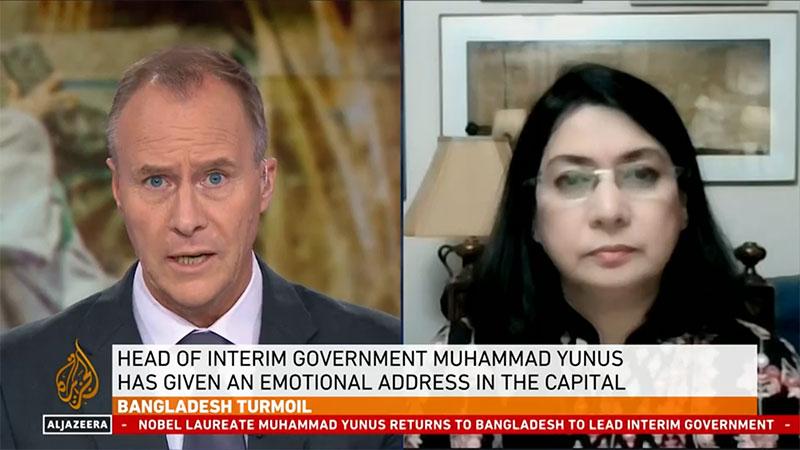Originally posted in AlJazeera on 11 August 2024

Al Jazeera: As we heard, Dr Yunus emphasised that law and order is his top priority, followed by ensuring free and fair elections. For the longer term, what should be his next focus for Bangladesh?
Dr Fahmida Khatun: The movement of the students has been driven by the deprivation and discrimination that have been present over the last 15 years under Sheikh Hasina’s regime. The underlying cause of the students’ movement was to address that discrimination. Although it started with the quota reform, it ultimately called for anti-discrimination measures. This is why it resonated with millions of people in Bangladesh who are also suffering.
Over the past two and a half years, inflationary pressure has been so high that it has eroded the purchasing power of ordinary people, those on fixed incomes, and the poor. Additionally, political and economic institutions have been severely damaged. The so-called growth narrative is now completely broken, as macroeconomic stability has weakened significantly, and this is reflected in various deteriorating economic fundamentals.
To start with, low investment—whether private domestic investment or foreign investment—low tax-to-GDP ratio, dwindling foreign exchange reserves, low employment creation capacity, and other economic indicators are all on a downward trend.
Al Jazeera: One element driving these movements is corruption within the economic and government structures. Yesterday, a story circulated about several central bank officials being forced to resign after 300 to 400 employees protested. Are we likely to see such actions increase as more cases of corruption become apparent?
Dr Fahmida Khatun: Yes, corruption has been pervasive across various sectors, with the banking sector being a prime example. However, corruption is also prevalent in other areas, such as public investment projects and the so-called mega projects, which are often marred by corruption and resource wastage. The banking sector, in particular, has been severely damaged over the past 15 years. Changes to the Banking Company Act were made to benefit politically connected directors, who used their influence to alter the rules in their favour. As a result, bank loan defaults have accumulated, with many defaults being the result of willful fraud, diverting public money.
Similarly, in the case of mega projects and infrastructure development, corruption and wastage have been so severe that the cost of each project has escalated multiple times compared to the initial estimates.
The challenge facing the new interim government is to implement institutional reforms. The previous government avoided such reforms as it was inclined to favour its own supporters. The nexus between corrupt politicians, bureaucrats, and businessmen created a system that enabled rent-seeking while depriving the rest of the population. Consequently, there has been insufficient investment to create enough jobs for the youth, leading to the quota system for public sector jobs being used as a distributional mechanism to reward party loyalists.


